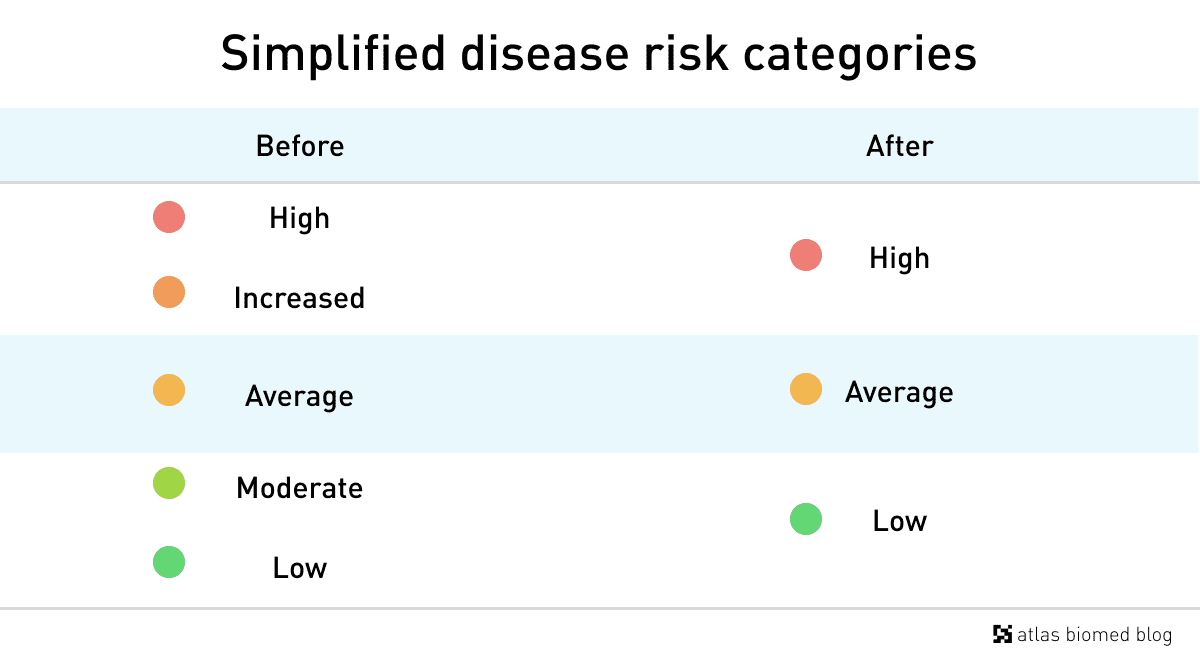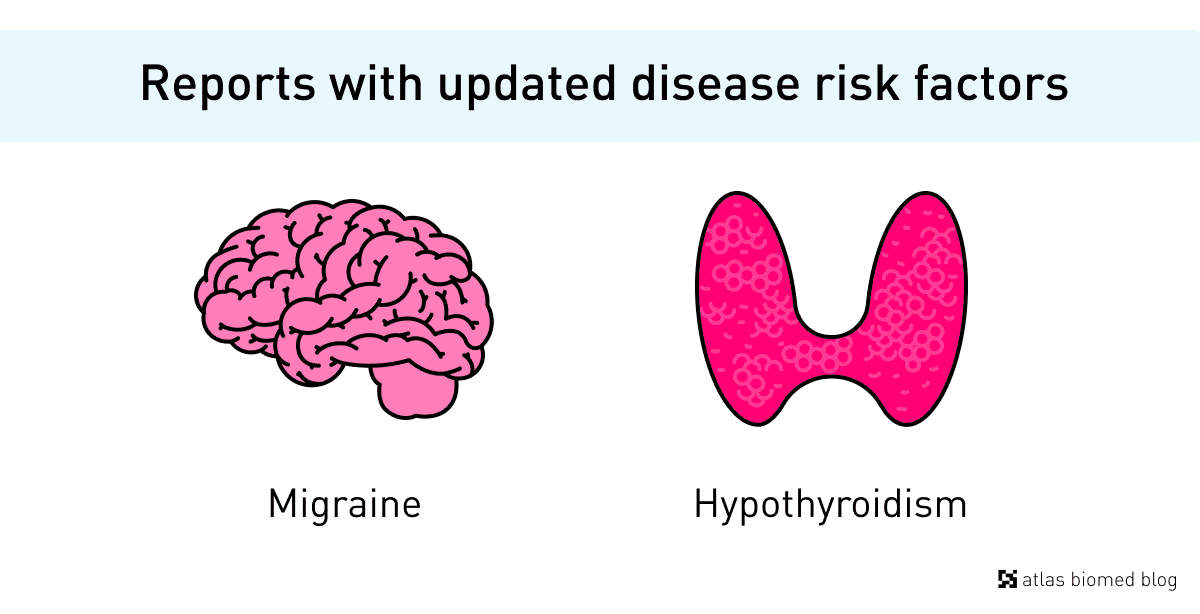We’ve updated your dashboard with clear and simple risk levels, refined our risk prediction models for multifactorial diseases, and modified the list of hereditary diseases in our interpretation system.
- Reduced risk categories from 5 to 3 (for clarity)
- Amended factors in calculating risk for hypothyroidism and migraine
- Edited the list of hereditary diseases analysed based on new evidence
We’re heralding the new year with some fundamental updates to our interpretation system. As science evolves and new studies are published, our team of scientists have been working hard to ensure that the Atlas DNA Test offers the most accurate and up-to-date information from the field of medical genetics.
☝The update has already been applied to your personal account. Fill in the questionnaire to refresh your reports.
Multifactorial disease risk updates

The Atlas DNA Test presents information about two types of risks: multifactorial and hereditary diseases. In this section, we explain what changes have occurred in your multifactorial disease risks.
Multifactorial diseases are non-infectious diseases that have many different risk factors, including biological sex, genetics, lifestyle, environment, family history, and more.
Disease risk categories
We’ve reduced the number of risk categories from 5 to 3: “low”, “average”, or “high” depending on your results and health questionnaire answers. Your recommendations have not changed.

Disease risks are calculated based on genetics and answers to the health questionnaire. The level of risk does not constitute a diagnosis, and it does not mean a person will develop a disease.
- Low disease risk: below-average probability of developing this disease
- Average disease risk: risk level on par with that of the general population
- High disease risk: above-average probability of developing this disease
We made this decision after reviewing user feedback, which indicated that the previous five risk categories were a source of confusion. Users reported that it was hard to distinguish the difference between ‘moderate’ and ‘average’, and ‘increased’ and ‘high'. This will not affect your recommendations.
☝ Got questions about your results? Ask a genetic counsellor (paid service). Click here to book a 30-min online consultation.
Multifactorial risk prediction models
We are gradually adopting machine-learning (ML) – an advanced form of data analysis – to streamline and enhance our risk interpretation models. ML is a more complex and reliable tool than the widely used, yet imperfect, polygenic risk scores (PRS).

Migraine risks
Migraines are severe headaches that may be accompanied by other symptoms, such as nausea and sensitivity to light and sound. Our new risk prediction model now takes into account these additional factors:
-
History of head trauma: risk factors based on studies about headache after trauma and the prevalence of headaches several years after traumatic brain injuries in veterans of the wars in Iraq and Afghanistan.
-
Diagnosis of depression: risk factors based on studies about mental health conditions and the frequency of migraines, and migraines and depression.
-
Physical activity level: risk factors based on the HUNT cohort study on the relationship between exercise and other risk factors with headaches.
-
Sleep duration: risk factors based on the cohort studies, including HUNT-2 and HUNT-3, and on the connection between sleep disturbances and headaches.
-
Body mass index: updated based on a meta-analysis of the association of migraines with body composition, and a study of risk factors for chronic headache.
The genetic risk factors for migraine have also been updated. Now, we use a more recent re-analysis of several meta-analyses on migraine genetics and an article on migraine biomarkers.
As we updated the interpretation with these additional risk factors, having a relative with migraines as a risk factor lost its predictive value and was removed from the report.

Hypothyroidism risks
Hypothyroidism is a condition marked by a chronic deficiency of thyroid hormones. Symptoms of an underactive thyroid include dry skin, low mood, weight gain, and constipation. Our new risk prediction model now takes into account these additional factors:
-
Body mass index: risk factors based on a meta-analysis and systematic review on the effect of obesity on autoimmunity and thyroid dysfunction.
-
Alcohol consumption: risk factors based on studies about moderate alcohol consumption and protection against autoimmune hypothyroidism, the relationship between lifestyle and thyroid dysfunction, and about alcohol use as a factor in the development of autoimmune thyroid diseases.
-
Diagnosis of rheumatoid arthritis: risk factors based on articles about the relationship between rheumatoid arthritis and thyroid dysfunction.
The genetic risk factors for hypothyroidism have also been updated. In addition to a review of shared genetic influences on 42 human traits, we now also include the results of a study on the genetics of hypothyroidism and autoimmune diseases, and a review of methodological improvements in genetic research.
Hereditary disease updates
Since February 2020, our team has carefully reviewed the evidence and selected new studies that influence the genetic variants involved in our hereditary disease reports. In this update, we added new genetic variants to our interpretation system and revised the data on the pathogenicity of previously known variants.

We use the ClinVar database to search for the latest scientific evidence on inherited diseases. This database, provided by the US National Institutes of Health, is a large archive of genetic variants and their relationship to illness used by healthcare professionals and researchers.
Changes in the hereditary disease reports
After careful review of the new scientific literature about hereditary diseases, we’ve updated the extensive list of gene variants used in our interpretation.
-
27 diseases added to the interpretation. These are new conditions for which there is now high-quality evidence of pathogenicity.
-
50 diseases removed from the interpretation after new scientific evidence was published that challenged previous findings.
-
New variants added to the interpretation for 152 hereditary diseases for which new evidence demonstrates unambiguous pathogenicity.
-
Variants removed from the interpretation of 27 diseases for which new evidence indicates uncertain pathogenicity.
-
Variants edited in the interpretation of 14 diseases. Some variants were replaced with others after the emergence of new evidence of pathogenicity.
The update is already available in your personal account. If you took the test before this update, you’ll need to complete your health questionnaire again so we can adjust your risk calculations.

















